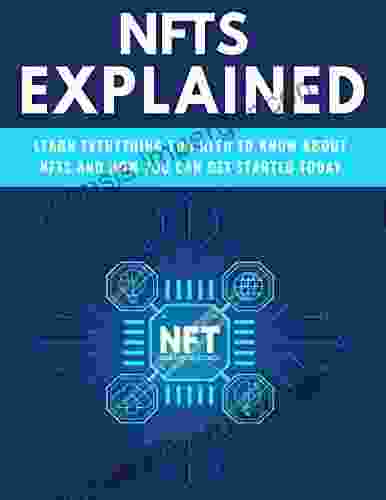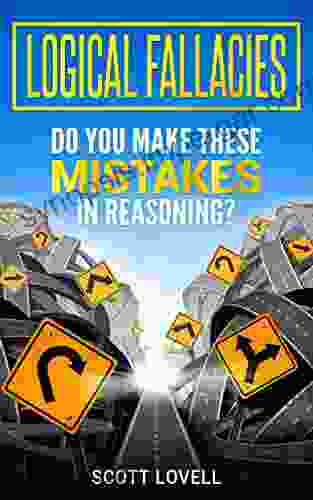Do You Make These Mistakes In Reasoning: And How To Avoid Them

We all make mistakes in reasoning from time to time. It's part of being human. But some mistakes are more common than others, and they can lead to serious problems in our thinking and decision-making.
In this article, we'll discuss some of the most common mistakes in reasoning and how to avoid them. We'll also provide some tips for improving your overall reasoning skills.
4.1 out of 5
| Language | : | English |
| File size | : | 3517 KB |
| Text-to-Speech | : | Enabled |
| Screen Reader | : | Supported |
| Enhanced typesetting | : | Enabled |
| Word Wise | : | Enabled |
| Print length | : | 70 pages |
| Lending | : | Enabled |
1. Hasty Generalization
A hasty generalization is a that is based on too little evidence. For example, if you see one person from a particular country being rude, you might conclude that everyone from that country is rude. This is a hasty generalization because you have not considered enough evidence to support your .
To avoid hasty generalizations, make sure that you have enough evidence to support your s. Consider all of the relevant evidence, and don't let your personal biases influence your thinking.
2. Begging the Question
Begging the question is a fallacy that occurs when you assume the truth of the in your argument. For example, if you argue that God exists because the Bible says so, you are begging the question because you are assuming the truth of the Bible in Free Download to prove the existence of God.
To avoid begging the question, make sure that your arguments are based on evidence and sound reasoning. Don't assume the truth of your , and don't rely on circular reasoning.
3. Ad Hominem
An ad hominem attack is a fallacy that occurs when you attack the person making the argument instead of the argument itself. For example, if you disagree with someone's political views, you might call them a "communist" or a "fascist." This is an ad hominem attack because you are attacking the person instead of their argument.
To avoid ad hominem attacks, focus on the argument itself. Don't attack the person making the argument, and don't let your personal biases influence your thinking.
4. Straw Man
A straw man is a fallacy that occurs when you misrepresent the other person's argument in Free Download to make it easier to attack. For example, if you argue that all gun control laws are bad, you might misrepresent the other person's argument as saying that all guns should be banned. This is a straw man because the other person may not actually believe that all guns should be banned.
To avoid straw man arguments, make sure that you accurately represent the other person's argument. Don't misrepresent their views, and don't exaggerate their claims.
5. False Dilemma
A false dilemma is a fallacy that occurs when you present two options as the only possible choices, when in reality there are other options available. For example, if you argue that we must either go to war or surrender, you are presenting a false dilemma. There may be other options available, such as negotiation or diplomacy.
To avoid false dilemmas, make sure that you consider all of the possible options. Don't present two options as the only possible choices, and don't ignore other viable options.
6. Appeal to Emotion
An appeal to emotion is a fallacy that occurs when you use emotions to persuade someone instead of facts and sound reasoning. For example, if you argue that we should ban abortion because it is morally wrong, you are using an appeal to emotion. You are trying to persuade people to agree with you by appealing to their emotions, not by providing facts and sound reasoning.
To avoid appeals to emotion, focus on the facts and sound reasoning. Don't try to persuade people to agree with you by appealing to their emotions.
7. Bandwagon
The bandwagon fallacy occurs when you argue that something is true because everyone else believes it. For example, if you argue that we should invest in a particular stock because everyone else is ng it, you are using the bandwagon fallacy. You are assuming that something is true because everyone else believes it, not because you have any evidence to support your claim.
To avoid the bandwagon fallacy, don't assume that something is true just because everyone else believes it. Consider the evidence and make your own decisions based on facts and sound reasoning.
Improving Your Reasoning Skills
In addition to avoiding the common mistakes in reasoning, there are a number of things you can do to improve your overall reasoning skills.
- Be open-minded. Don't be afraid to consider new ideas and perspectives. Be willing to change your mind if the evidence supports a different .
- Be critical. Don't accept everything you hear or read at face value. Question everything, and be willing to challenge the assumptions that you hold.
- Be logical. Make sure that your arguments are based on sound reasoning. Don't rely on fallacies or emotional appeals.
- Be aware of your own biases. We all have biases, but it's important to be aware of them so that they don't influence our thinking.
- Practice. The best way to improve your reasoning skills is to practice. Try to identify the mistakes in reasoning that you make, and work on avoiding them in the future.
By following these tips, you can improve your overall reasoning skills and make better decisions in all areas of your life.
Mistakes in reasoning are common, but they can be avoided with practice. By being aware of the most common mistakes and by following the tips above, you can improve your overall reasoning skills and make better decisions in all areas of your life.
4.1 out of 5
| Language | : | English |
| File size | : | 3517 KB |
| Text-to-Speech | : | Enabled |
| Screen Reader | : | Supported |
| Enhanced typesetting | : | Enabled |
| Word Wise | : | Enabled |
| Print length | : | 70 pages |
| Lending | : | Enabled |
Do you want to contribute by writing guest posts on this blog?
Please contact us and send us a resume of previous articles that you have written.
 Book
Book Novel
Novel Page
Page Chapter
Chapter Text
Text Story
Story Genre
Genre Reader
Reader Library
Library Paperback
Paperback E-book
E-book Magazine
Magazine Newspaper
Newspaper Paragraph
Paragraph Sentence
Sentence Bookmark
Bookmark Shelf
Shelf Glossary
Glossary Bibliography
Bibliography Foreword
Foreword Preface
Preface Synopsis
Synopsis Annotation
Annotation Footnote
Footnote Manuscript
Manuscript Scroll
Scroll Codex
Codex Tome
Tome Bestseller
Bestseller Classics
Classics Library card
Library card Narrative
Narrative Biography
Biography Autobiography
Autobiography Memoir
Memoir Reference
Reference Encyclopedia
Encyclopedia Steven J Dick
Steven J Dick Devon Miller
Devon Miller Frank Jackson
Frank Jackson Sergio Pellis
Sergio Pellis Dean Krippaehne
Dean Krippaehne Dianne Harman
Dianne Harman John Mordechai Gottman
John Mordechai Gottman Denis Hambucken
Denis Hambucken David Rodman
David Rodman Larry Mcshane
Larry Mcshane Deborah Canja
Deborah Canja Pumla Dineo Gqola
Pumla Dineo Gqola Senan Molony
Senan Molony David Wlazlak
David Wlazlak David Murphy
David Murphy Deborah L Fruchey
Deborah L Fruchey David R Roediger
David R Roediger Eberhard Schmidt
Eberhard Schmidt David Wiscombe
David Wiscombe Fiona Cobb
Fiona Cobb
Light bulbAdvertise smarter! Our strategic ad space ensures maximum exposure. Reserve your spot today!

 Raymond ChandlerBetter Program Management and Oversight of Postsecondary Schools Needed to...
Raymond ChandlerBetter Program Management and Oversight of Postsecondary Schools Needed to...
 Chinua AchebeHow Women Got Their Curves and Other Just-So Stories: Exploring the Wonders...
Chinua AchebeHow Women Got Their Curves and Other Just-So Stories: Exploring the Wonders... Darren NelsonFollow ·12.7k
Darren NelsonFollow ·12.7k Edward BellFollow ·16.4k
Edward BellFollow ·16.4k Sammy PowellFollow ·14.3k
Sammy PowellFollow ·14.3k Kevin TurnerFollow ·19.2k
Kevin TurnerFollow ·19.2k Milton BellFollow ·16.9k
Milton BellFollow ·16.9k Carlos DrummondFollow ·14.1k
Carlos DrummondFollow ·14.1k Anthony BurgessFollow ·19.7k
Anthony BurgessFollow ·19.7k Rick NelsonFollow ·11.7k
Rick NelsonFollow ·11.7k

 Ivan Turgenev
Ivan Turgenev38 Art Made During The Pandemic Digitally Enhanced Art...
By [Author's Name] The year 2024 was a time...

 F. Scott Fitzgerald
F. Scott FitzgeraldAmazing Cooking Guide To South Beach Diet: Your Culinary...
Embark on a...

 Zachary Cox
Zachary CoxGeneral History of Chinese Film: A Journey Through Time...
Origins and...

 Cristian Cox
Cristian CoxUnderstanding Antidepressants: An In-Depth Guide to...
Unleashing the Power of...

 Jeremy Cook
Jeremy CookUnlock the NFT Revolution: A Comprehensive Guide for...
The world of Non-Fungible Tokens (NFTs) has...

 Kevin Turner
Kevin TurnerSeneca and Roman Slavery Under Nero's Rule: An In-Depth...
During the reign of...
4.1 out of 5
| Language | : | English |
| File size | : | 3517 KB |
| Text-to-Speech | : | Enabled |
| Screen Reader | : | Supported |
| Enhanced typesetting | : | Enabled |
| Word Wise | : | Enabled |
| Print length | : | 70 pages |
| Lending | : | Enabled |







